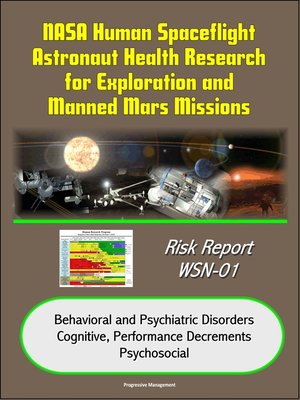NASA Human Spaceflight Astronaut Health Research for Exploration and Manned Mars Missions, Risk Report WSN-01, Behavioral and Psychiatric Disorders, Cognitive, Performance...
ebook
By Progressive Management

Sign up to save your library
With an OverDrive account, you can save your favorite libraries for at-a-glance information about availability. Find out more about OverDrive accounts.
Find this title in Libby, the library reading app by OverDrive.



Search for a digital library with this title
Title found at these libraries:
| Loading... |
Professionally converted for accurate flowing-text e-book format reproduction, this series of reports deals with ongoing research by NASA into a risk reduction strategy for human space exploration and planned manned missions to Mars. Each report deals with a unique aspect of the human research needed to pursue long-duration missions. Many of the reports contain exclusive details about medical events impacting astronauts and cosmonauts on earlier flights, including Mir, Space Shuttle, and ISS Space Station missions.
Each risk Evidence Report contains a narrative discussion of the risk and its supporting evidence. All cited publicly-available references are listed at the end of the report. In addition, data that are significant or pivotal are summarized in text, tables, and charts in sufficient detail to allow the reader to critique the data and draw conclusions. The authors also indicate whether the data are from human, animal, or tissue, cellular, or molecular studies. The reports discuss evidence from both spaceflight (including biomedical research, Medical Requirements Integration Document [MRID] data, and operational performance or clinical observations) and ground (including space analog research and non-space analog biomedical or clinical research) research. When providing evidence from ground-based studies, authors discuss why these results are likely to be applicable in the space environment, offering any available validation information for the use of these ground-based systems.
Reports included in this compilation:
Evidence Report: Risk of Adverse Cognitive or Behavioral Conditions and Psychiatric Disorders * Evidence Report: Risk of Performance and Behavioral Health Decrements Due to Inadequate Cooperation, Coordination, Communication, and Psychosocial Adaptation within a Team
Any space flight, be it of long or short duration, occurs in an extreme environment that has unique stressors. Even with excellent selection methods, the potential for behavioral problems among space flight crews remain a threat to mission success. Assessment of factors that are related to behavioral health can help minimize the chances of distress and, thus, reduce the likelihood of adverse cognitive or behavioral conditions and psychiatric disorders arising within a crew. Similarly, countermeasures that focus on prevention and treatment can mitigate the cognitive or behavioral conditions that, should they arise, would impact mission success. Given the general consensus that longer duration, isolation, and confined missions have a greater risk for behavioral health ensuring crew behavioral health over the long term is essential.
Crew health and performance is critical to successful human exploration beyond low Earth orbit. The Human Research Program (HRP) investigates and mitigates the highest risks to human health and performance, providing essential countermeasures and technologies for human space exploration. Risks include physiological and performance effects from hazards such as radiation, altered gravity, and hostile environments, as well as unique challenges in medical support, human factors, and behavioral health support. The HRP utilizes an Integrated Research Plan (IRP) to identify the approach and research activities planned to address these risks, which are assigned to specific Elements within the program.
The HRP utilizes various research platforms to conduct research. Ground research occurs in laboratories and analogs that mimic a portion of the spaceflight environment. In addition, the International Space Station (ISS) is used to conduct research requiring the unique environment of space. Spaceflight data primarily identify and/or quantify...






